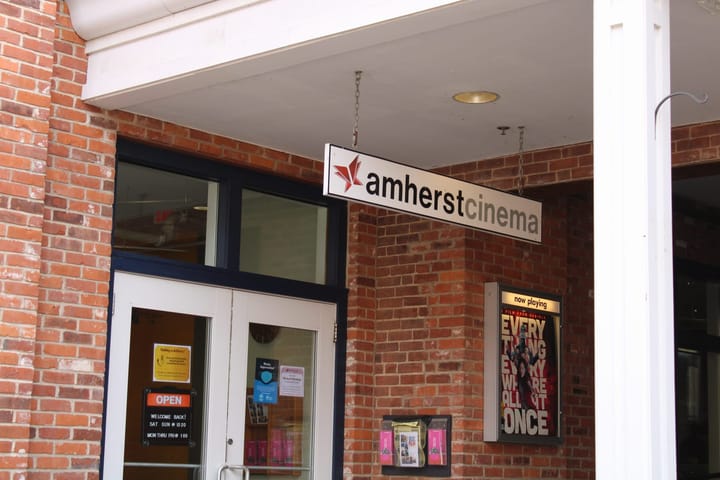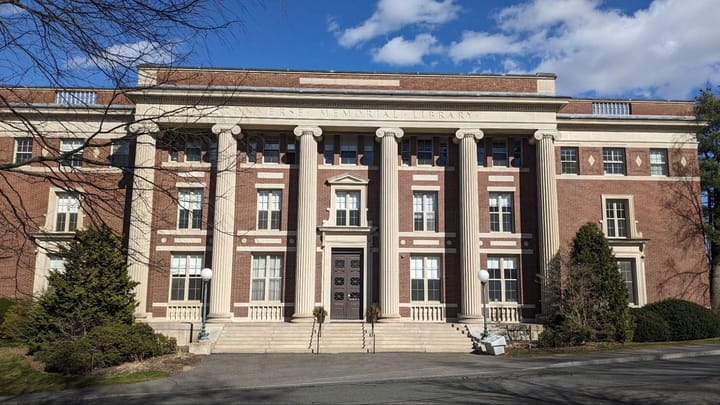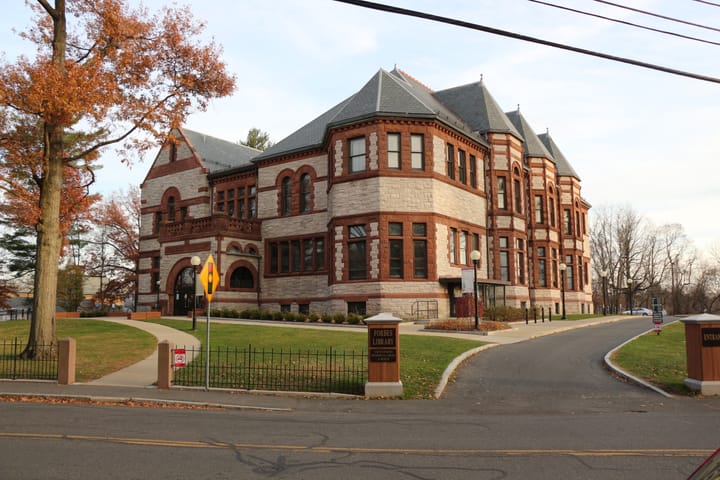New AAS E-board Speaks on Campaigns and Goals
The Student spoke with the newly elected AAS e-board on their new positions. The electees include President Sirus Wheaton ’23, Vice-President Jaden Richards ’25, Treasurer Dania Hallak ’24, Secretary Jeffery Ma ’24, and Judiciary Chair Alex Jabor ’23.
The new executive board (e-board) for the Association of Amherst Students (AAS) was elected on April 7. The electees include President Sirus Wheaton ’23, Vice-President Jaden Richards ’25, Treasurer Dania Hallak ’24, Secretary Jeffrey Ma ’24, and Judiciary Chair Alex Jabor ’23. The Student sat down with the new e-board members to learn about their experience, policies, and goals.
President Sirus Wheaton ’23
Q: Where were you when you found out you won? What was your immediate reaction?
A: I was in New York, and I was with people from Amherst, and I wasn’t checking my phone — I was with an alumni too — and then, Sydney Ireland [’23] came over to me and was like, “Oh, congrats.” Or maybe Maya Foster [’23] was like, “Oh, congrats.” And I was like, “What the f — k, that’s pretty cool.” So I was really excited, and then my brother called me, so [my reaction was] just a lot of excitement and happiness.
Q: What led you to decide to run for president? How was that decision made?
A: I’ve been pretty lucky here at Amherst. I find a lot of people that I look up to. Someone who always looked after me was [former AAS President] Jeremy Thomas [’21], and I wanted to do a lot of the things that he did. Especially when I was a first-year, and then as a senator, I really saw how the whole process works and how as president, you have so much more access to certain people and also more influence on the administration. And I saw how difficult it was trying to get certain things done, or how I thought certain things should kind of be organized, and I thought the best route for me would be to try to be president and try to get the things that I want to do done.
Q: What aspects of your platform or campaign do you believe spoke to the Amherst community?
A: I think it was [my] being driven and actually having things that I wanted to get done that I got done. I said I wanted to do this laundry project, and then I got some of it done. And just the fact that I had laid out goals that I wanted to do, like saying I wanted to make a Diversity Council, or even talking about … reparations and using our rainy day fund, and being an active Senate, or a proactive Senate. So I think just that, coupled with being a nice guy.
Q: Now that you’ve won, what are you going to do first? Additionally, what are some of your longer term goals?
A: Senate needs to be more visible and more transparent, so I guess how I want to do that — I don’t know if anybody’s ever talked about it before — [is] Senate office hours, times where people on Senate or on the e-board can just be someplace to talk. And then also a diversity council, where leaders of affinity groups have a standing meeting with people on Senate where they can talk about the things that are going on for them and how the Senate can represent them. An issue to talk about is student compensation. With [AAS officials] getting paid [salaries], … that will [impact] other groups … What I really am thinking of is how as president, or as a senator, we can leverage, a bunch of … individual projects. Because you’ll hear of a lot of these campaigns or petitions, or just these students that have really great ideas.
Q: Is there anything else you would like to say to the Amherst community?
I’m excited!
Vice-President Jaden Richards ’25
Q: Where were you when you found out you won? What was your immediate reaction?
A: I was taking my friend from Smith home when the results were released. While I was excited — my friend certainly was — I immediately felt a little worried about my ability to be a good vice-president, though I did take a mini victory lap on the drive home.
Q: What led you to decide to run for vice-president?
A: I had not heard of any other potential candidates and, even if someone was running, I think that elections for every student office should be competitive. After thinking through a potential campaign, I knew that there were many things I would do to make [the] AAS more effective in its role as the student government.
Q: What aspects of your campaign do you believe spoke to the Amherst community?
A: If I had to guess, I think people voted for the person they knew best, which I do not think is a bad thing — I would like to think that my peers have either seen me in the classroom, on Senate, or even in the dining hall and have come to trust my judgment and genuine desire to improve the fare of students at Amherst.
Q: Now that you’ve won, what are you going to do first? Additionally, what are some of your longer term goals?
A: Unfortunately, the things that will come first are probably the things that are the least interesting. We (the new board) are sworn in at an awkward time, so my current job is to keep [the] AAS together until a new cohort of senators are sworn in. We are going to start office hours this week in Val which, hopefully, will become a permanent part of what [the] AAS does! I do not want to over promise on massive long-term goals but (I think) cool things are coming!
Q: Is there anything else you would like to say to the Amherst community?
A: Read The Student! For the moment, it is the easiest way for [the] AAS to publicize what it does and student engagement is essential for any student government to function. I would also ask you guys to let us know about any complaints you have about the school, no matter how small!
Treasurer Dania Hallak ’24
Q: Where were you when you found out you had won treasurer? What was your immediate reaction?
A: I think my situation is a little bit different because … I kind of knew that I was going to end up winning because on Speech Night, I discovered that I was the only candidate and therefore likely the person winning.
I was excited. The reason that I ran for [treasurer] is because I was really excited to be able to change a couple of the policies and [make it] so things that could be run more efficiently. I was sad that nobody else [ran]; I was a little bit disappointed that I was the only option there. But I'm excited to be treasurer. I of course ran for it because I wanted to win.
Q: What policies and aspects of your campaign do you think appealed to the Amherst community?
A: I think what appealed [to people] was explaining the funding process. A lot of people don't understand how funding requests work and why we turn away certain people — often there's funding for them from other offices. Another reason [the campaign appealed to people] could be because I want BC [budgetary committee] to be more accessible. I told people that if they didn't know how to ask for a request, they could come in at 7 p.m. — before our meetings start at 7:15 p.m — so they can ask questions about [that]. So [one of my goals has been] assisting people with how they can ask for requests and working with the student body.
Q: Now that you’re treasurer, what’s your first goal? And what are some of the longer-term things you want to accomplish?
A: One of the bigger goals right now is the transition back toward pre-Covid life on campus. Part of that includes increasing our caps: we're working on immediately adjusting for inflation. For example, we’re changing how much we reimburse for gas prices. With that, however, there's a push and pull, because for us to go back fully to pre-Covid times, we would need the student activity fee to increase. Right now, what we're trying to figure out is how can we attempt to adjust to the times, take into account inflation, help the Amherst community go back to their social [situations] before Covid, all while still understanding that there is a budget constraint as the Student Activities fee is still lower.
In the future, I think compensating lower-income student workers on campus is an important project that we should do. This would allow for more representation. We already funded a couple students [working] for The Student. So I just think that providing resources for students to be able to be a part of these things without endangering or taking advantage of their work study [would be a positive change].
Q: Do you have anything else you would like to say to the Amherst community?
A: I understand that BC is scary. I think what I’d tell them though, is that BC is a bunch of students. What we want to do is help fund things on campus and make social and extracurricular spaces more lively and supported. We can work together. I can help guide them [students]. If you have any confusion about policies, you can come in [to the Red Room] and ask about them, preferably before BC time. But from 7 to 7:15 p.m., I’ll be there. You can also email me.
Secretary Jeffrey Ma ’24
Q: Where were you when you found out you won? What was your immediate reaction?
A: I was ushering for the Amherst Symphony Orchestra. During the concert I was ushering, I saw [former AAS Secretary] Lucas [Romualdo ’24] head in during the concert, then he came out during intermission. He was like, “Check your email.” I check my email. Voilà. But I mean, I was ambivalent. I was like, “[If] I get it, I get it, [If I don’t], I don’t.”
Q: What led you to decide to run for secretary?
A: Monday before elections, no one was running [for secretary]. So I think [former Vice-President] Basma [Azzamok ’22] and Lucas were talking. … Monday morning at Suhur, I was fasting for Ramadan. [On the] morning of [the speeches], Basma said that no one was running. So I was like, “I’ll think about it.” Monday night, still no one was running, so I kept thinking about it. I think it was Tuesday at 8 p.m. I was like, “You know, screw it. I’ll do it.”
Q: What aspects of your campaign do you believe spoke to the Amherst community?
A: I’ll admit, I don’t have many strong policy positions. If I had to describe myself, I'd say, “I’ll do what I’m told.” I feel much more like a technocrat than [anything else.]
Q: Now that you’ve won, what are you going to do first? Additionally, what are some of your longer term goals?
A: We’re looking to get a new van, possibly, for the community. There’s two vans right now and they’re almost always booked. I was talking with [Senator] Allie [Ho ’24], and she was saying how she would always [have to] book [a van] an entire month in advance … because they were so in demand. We’re just looking to see whether or not the college would be willing to put up funds.
Q: Is there anything else you would like to say to the Amherst community?
A: I’m glad I can do something for the community. These are things that have to be done and I’m glad to do them.
Judiciary Council Chair Alex Jabor ’23
Q: Where were you when you found out you won? What was your immediate reaction?
A: I was in the middle of the orchestra concert, and I checked my email right during a little break, saw that I won, and I couldn't really be loud about it. So my friend fist-bumped me, I celebrated for half a second, watched the last piece, and then went outside, congratulated my friends who were playing [in the concert], and then celebrated that night. It felt really good. It was a relief; in a way, it felt like a lot of the work that I did over the last two years on JC [Judiciary Council] was recognized.
Q: What led you to decide to run for Judiciary Council chair?
A: I've been on JC as an at-large member for two years before becoming JC chair. During that time, not only would I see what the [previous] chairs were doing, but also I got to interact with every single part of JC’s power, from doing constitutional review to adjudication over a complaint. When the email came out to run, I was like, “I feel ready,” not only because I've seen everything that JC has done in the last few years and what they can do within their powers, but I also have an idea of where they can move forward. And where we can grow and become stronger and help not only the Senate, but the student body as well.
Q: Now that you’ve won, what are you going to do first? Additionally, what are some of your longer term goals?
A: I would say first, [my goal is] restructuring the complaint process. Part of that is making the complaint process more accessible to students — a standardized Google Form, having it written into the constitution that complaints can be made flexible — if new evidence comes up, we can change things around and you are allowed to amend your complaint. We should have rules governing how that information is sought out when it's released. We need to address the issue where people hear “judiciary council” and they go “What's that?” It [the Judiciary Committee] is really only a significant body during that period once a year, once every two years when a big decision is being made. But fundamentally, people should know more about it because it is a resource that anyone can use: we govern clubs being in good standing or not, that's part of our power. So making it more open and making it more known to students makes it a more transparent and accessible body.
Q: Is there anything else you would like to say to the Amherst community?
A: As JC chair and as a member of the AAS e-board as a whole, I want to be as accessible as possible. I want to hear what it is that you think that we can be doing. I have my ideas for JC and I try to be as connected to the community as I can, but if there is something that you want to see happen, bring it to my attention. Feel free to reach out and to come up because, I mean fundamentally, [the] AAS is what we all make of it collectively as a body and so it should work for all of us here.





Comments ()